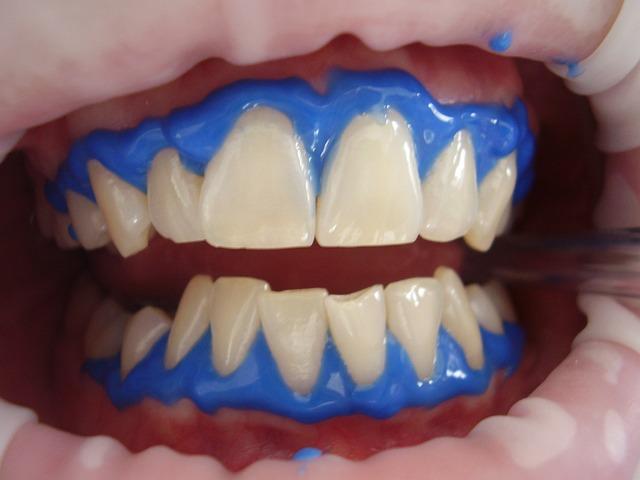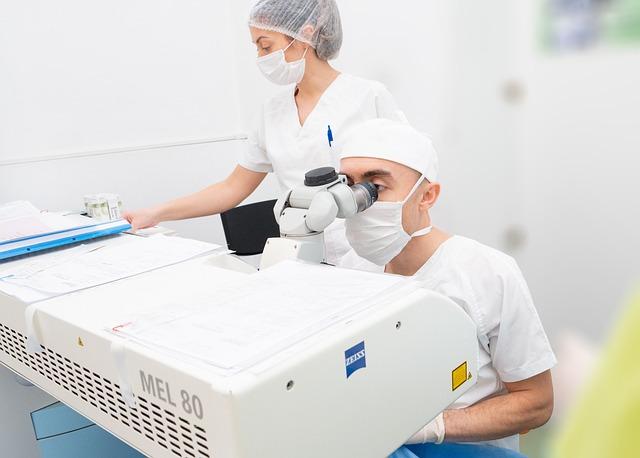How Laser Teeth Whitening Works: Exploring the Science Behind It
Have you ever wondered how laser teeth whitening actually works? In this article, we’ll take a deep dive into the science behind this popular cosmetic dental procedure. Prepare to be fascinated as we explore the technology and techniques that make your smile shine bright.
Contents
- How Laser Teeth Whitening Works
- The Role of Hydrogen Peroxide in Teeth Whitening
- Understanding the Process of Activation with Laser Light
- Advantages of Laser Teeth Whitening over Traditional Methods
- Safety Considerations and Risks Associated with Laser Whitening
- The Science Behind Stain Removal and Brightening of Enamel
- Effectiveness of Laser Treatment for Stubborn Stains and Discoloration
- Professional Recommendations for Post-Whitening Care and Maintenance
- Comparing Laser Teeth Whitening to At-Home Kits and Other Treatments
- To Wrap It Up
How Laser Teeth Whitening Works
Laser teeth whitening is a popular cosmetic procedure that can dramatically improve the appearance of your smile. This cutting-edge treatment uses a special type of laser light to whiten teeth quickly and effectively. But how does it actually work? Let’s explore the science behind this innovative method.
- The first step in laser teeth whitening is to apply a whitening gel to the surface of the teeth. This gel contains hydrogen peroxide, which is the active ingredient that helps to break down stains and discoloration on the enamel.
- Once the whitening gel is applied, a special laser light is used to activate the hydrogen peroxide and accelerate the whitening process. The laser light helps to penetrate the enamel and target the stains deep within the teeth.
- The energy from the laser light stimulates the hydrogen peroxide molecules, causing them to break apart and release oxygen ions. These oxygen ions then react with the discolored molecules in the teeth, breaking them down and lightening the overall color of the teeth.
- The entire process usually takes about an hour to complete, and most patients see noticeable results after just one session. Laser teeth whitening is a safe and effective way to achieve a brighter, whiter smile in no time.

The Role of Hydrogen Peroxide in Teeth Whitening
Hydrogen peroxide is a key ingredient in many teeth whitening products because of its ability to effectively bleach teeth and remove stains. When used in teeth whitening treatments, hydrogen peroxide penetrates the enamel and dentin layers of the teeth, breaking down the molecules that cause discoloration. This results in a brighter, whiter smile.
One popular method of teeth whitening that utilizes hydrogen peroxide is laser teeth whitening. During a laser teeth whitening treatment, a dentist will apply a hydrogen peroxide gel to the teeth and then use a laser to activate the gel, speeding up the whitening process. The laser helps to break down the hydrogen peroxide molecules, allowing them to penetrate deeper into the teeth for more effective whitening.
It is important to note that while hydrogen peroxide is effective at whitening teeth, it can also cause sensitivity in some individuals. This is why it is important to consult with a dentist before undergoing any teeth whitening treatment, especially if you have sensitive teeth or gums.
Overall, hydrogen peroxide plays a crucial role in teeth whitening treatments, particularly in laser teeth whitening. By understanding the science behind how hydrogen peroxide works to whiten teeth, you can make an informed decision about the best teeth whitening method for you.

Understanding the Process of Activation with Laser Light
Laser teeth whitening is a popular cosmetic procedure that involves the use of laser light to activate whitening agents applied to the teeth. The process is designed to effectively remove stains and discoloration, resulting in a brighter and whiter smile. So, how does it actually work?
When the laser light is applied to the teeth, it triggers a chemical reaction with the whitening gel, which contains hydrogen peroxide or carbamide peroxide. This reaction helps to break down stain molecules on the surface of the teeth, allowing the whitening agents to penetrate deeper into the enamel. As a result, the teeth are able to achieve a noticeably whiter appearance.
One of the key benefits of laser teeth whitening is its speed and efficiency. The concentrated beam of light allows for quicker results compared to traditional whitening methods. Additionally, the precision of the laser helps to target specific areas of discoloration, ensuring a more even and consistent whitening effect.
In summary:
- Laser light activates whitening agents on the teeth
- Chemical reaction breaks down stain molecules
- Quick and efficient results
- Precision targeting for even whitening
| Advantages | Disadvantages |
|---|---|
| Fast results | Potential sensitivity |
| Even whitening | Costlier than some alternatives |

Advantages of Laser Teeth Whitening over Traditional Methods
While there are various methods available for teeth whitening, laser teeth whitening stands out as a highly effective and efficient option. Here are some of the advantages of opting for laser teeth whitening over traditional methods:
- Quick Results: Laser teeth whitening typically produces results in just one session, compared to multiple sessions required for traditional methods.
- Precision: The focused laser energy targets specific areas of discoloration, ensuring a more even and thorough whitening process.
- Less Sensitivity: Laser teeth whitening is known to cause less sensitivity during and after the procedure, making it a more comfortable experience for patients.
- Long-Lasting Effects: The results of laser teeth whitening can last longer than those of traditional methods, requiring fewer touch-ups in the future.

Safety Considerations and Risks Associated with Laser Whitening
When it comes to laser teeth whitening, there are some important safety considerations and risks to keep in mind. While this procedure is generally safe and effective, it is essential to be aware of potential risks before undergoing treatment. Here are some key points to consider:
- Potential risks: While laser whitening is considered safe, some individuals may experience temporary sensitivity or irritation after the procedure. In rare cases, there have been reports of gum irritation or damage to tooth enamel.
- Consultation with a dentist: Before undergoing laser teeth whitening, it is crucial to consult with a dentist to ensure that you are a suitable candidate for the procedure. Your dentist will evaluate your oral health and determine if laser whitening is right for you.
- Protective measures: During the laser whitening procedure, your dentist will take steps to protect your gums and other oral tissues from exposure to the laser. Protective eyewear will also be provided to shield your eyes from the bright light.

The Science Behind Stain Removal and Brightening of Enamel
In laser teeth whitening, a specialized dental laser is used to remove deep-seated stains and brighten enamel. The science behind this process lies in the interaction between the laser light and the stained molecules on the teeth. The laser energy activates a whitening agent that is applied to the teeth, causing a chemical reaction that breaks down the stains and lightens the enamel.
During the laser teeth whitening treatment, the laser light targets the chromophores in the stains, breaking them down into smaller molecules. This process helps to remove tough stains that are deeply embedded in the enamel, resulting in a brighter and whiter smile. Additionally, the laser energy stimulates the enamel, promoting a natural brightening effect that enhances the overall appearance of the teeth.
The precision of the laser technology ensures that only the stained areas are targeted, minimizing any damage to the surrounding healthy enamel. Unlike traditional whitening methods, laser teeth whitening is quick, efficient, and produces long-lasting results. With advancements in dental technology, more individuals are opting for laser teeth whitening to achieve a radiant smile with minimal discomfort and downtime.
Effectiveness of Laser Treatment for Stubborn Stains and Discoloration
Laser teeth whitening is a popular cosmetic procedure that utilizes advanced technology to improve the appearance of stained and discolored teeth. The lies in its ability to target deep-set stains that traditional whitening methods may struggle to remove. By using a concentrated beam of light, the laser can break down the molecules causing the discoloration, resulting in a brighter, whiter smile.
During the procedure, a protective barrier is applied to the gums to shield them from the laser. The dentist then applies a whitening gel to the teeth, which is activated by the laser to accelerate the whitening process. The laser energy activates the gel, allowing it to penetrate the enamel and break down tough stains.
One of the key benefits of laser teeth whitening is its efficiency. In just one session, patients can achieve noticeable results, with many seeing their teeth lighten by several shades. Additionally, the procedure is typically painless and quick, making it a convenient option for those looking to enhance their smile.
| Pros: | Quick and efficient | Targets deep stains |
|---|---|---|
| Cons: | Higher cost compared to traditional whitening methods | May require multiple sessions for optimal results |

Professional Recommendations for Post-Whitening Care and Maintenance
One essential aspect of maintaining the results of your laser teeth whitening treatment is to follow professional recommendations for post-whitening care. Here are some tips to help you keep your smile bright and beautiful:
- Avoid consuming dark-colored foods and beverages such as coffee, tea, red wine, and berries for at least 24-48 hours after treatment.
- Brush your teeth gently with a soft-bristled toothbrush and non-abrasive toothpaste to prevent damage to the enamel.
- Use a whitening toothpaste or mouthwash to help maintain the brightness of your teeth.
- Visit your dentist regularly for check-ups and professional cleanings to ensure the longevity of your results.
In addition to these recommendations, it is essential to practice good oral hygiene habits to prolong the effects of your laser teeth whitening treatment. By following these guidelines, you can enjoy a radiant smile for months to come.
| Recommended | Avoid |
|---|---|
| Regular dental check-ups | Dark-colored foods and beverages |
| Whitening toothpaste | Smoking |
| Soft-bristled toothbrush | Harsh or abrasive toothpaste |

Comparing Laser Teeth Whitening to At-Home Kits and Other Treatments
Laser teeth whitening is a popular cosmetic dental procedure that can brighten your smile by several shades in just one visit to the dentist. The process involves the use of a specialized laser light that activates a whitening gel containing hydrogen peroxide. This powerful combination penetrates the enamel of your teeth to break down stains and discoloration, leaving your teeth looking noticeably whiter and brighter.
When , there are several factors to consider. Here are some key points to keep in mind:
– **Effectiveness**: Laser teeth whitening is typically more effective than at-home kits due to the professional-grade equipment and stronger whitening agents used in the procedure.
– **Speed**: Unlike at-home kits that may take weeks to show results, laser teeth whitening can provide immediate and dramatic improvements in just one session.
– **Safety**: While at-home kits are generally safe when used as directed, laser teeth whitening is performed by trained professionals who can ensure the procedure is done correctly to minimize any potential risks.
Overall, laser teeth whitening is a quick and effective way to achieve a brighter smile, but it may come at a higher cost compared to at-home kits. It’s important to weigh the pros and cons of each option to determine which treatment is best suited to your needs and budget.
To Wrap It Up
In conclusion, laser teeth whitening is a safe and effective way to achieve a brighter smile. By utilizing a specialized whitening gel and laser light technology, the treatment can remove stubborn stains and discoloration with precision and speed. Understanding the science behind the process can help you make an informed decision about whether laser teeth whitening is right for you.
Remember, always consult with a dental professional before undergoing any whitening treatment to ensure the best results. A bright, confident smile is just a laser treatment away! So why wait? Book your laser teeth whitening session today and start showing off your pearly whites with pride.








 BREAKING DENTAL DISCOVERY:
BREAKING DENTAL DISCOVERY:  Limited supply - 83% of today's inventory already claimed!
Limited supply - 83% of today's inventory already claimed!